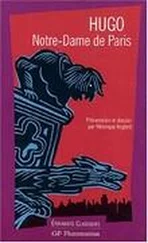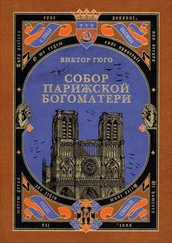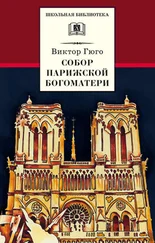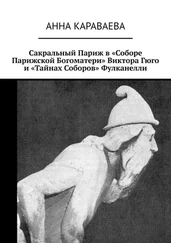Виктор Гюго / Victor Hugo
Собор Парижской богоматери / Notre-Dame de Paris
© Дубиковская И. Г., адаптация текста и словарь, 2019
© ООО «Издательство АСТ», 2019
On the sixth of January, 1482, the Parisians awoke to the sound of the bells.
What put the whole population of Paris in commotion, were the two events happening at once: the Epiphany and the Feast of Fools.
On that day, there was to be a bonfire on the Place de Grève, a maypole at the Chapelle de Braque, and a mystery at the Palais de Justice. So the citizens, male and female, having closed their houses and shops, walked from every direction, towards one of the three spots designated.
The people knew knew that the Flemish ambassadors, who had arrived two days previously, intended to be present at the representation of the mystery, and at the election of the Pope of the Fools, which was also to take place in the grand hall. So it was no easy matter on that day, to force one’s way into that grand hall. Thousands of faces were at the windows, the doors, the dormer windows, the roofs, gazing at the palace, gazing at the populace, and asking nothing more; for many Parisians that was enough.
The piece was only to begin at midday. It was very late, no doubt, for a theatrical representation, but it was necessary to suit the convenience of the ambassadors.
Now, the crowd had been waiting since morning. People had been shivering since daybreak before the grand staircase of the palace; some even spent the night across the threshold of the great door, in order to make sure that they were the first to go in. The crowd grew more dense every moment. People were impatient and weary.
Midday sounded.
Each person arranged himself and assumed his post. Then came a great silence; all necks remained outstretched, all mouths remained open, all glances were directed towards the marble table in the middle. Nothing made its appearance there. All eyes turned to the places reserved for the Flemish envoys. The door remained closed, the platform empty. No one had arrived on time.
On this occasion, it was too much.
They waited one, two, three, five minutes, a quarter of an hour; nothing came. The impatience turned to wrath. “The mystery! The mystery!” they murmured, in hollow voices. Just when the crowd’s impatience was about to turn violent, the tapestry of the dressing-room was raised, and a person stepped in. The mere sight of him suddenly stopped the crowd, and changed its wrath into curiosity.
“Silence! silence!”
The person advanced to the edge of the marble table with a vast amount of bows.
Tranquillity had gradually been restored.
“Messieurs and Mesdemoiselles, we shall have the honor of declaiming and representing, before his eminence, the cardinal, a very beautiful morality which has for its title, ‘The Good Judgment of Madame the Virgin Mary.’ I am to play Jupiter. His eminence is, at this moment, escorting the very honorable embassy of the Duke of Austria; which is detained, at present, listening to the rector of the university, at the gate Baudets. As soon as the cardinal arrives, we will begin.”
Chapter II
Pierre Gringoire
The satisfaction and admiration unanimously excited by his appearance were dissipated by his words.
“Begin instantly! The mystery! The mystery immediately!” shrieked the people.
Poor Jupiter, frightened, bowed and trembled and stammered: “His eminence—the ambassadors—Madame Marguerite of Flanders—” He did not know what to say.
Luckily, some one came to rescue him from his embarrassment, and assume the responsibility.
An individual who was standing beyond the railing, in the free space around the marble table, tall, gaunt, blond, still young, with brilliant eyes and a smiling mouth, clad in garments of black serge, made a sign to the poor sufferer.
“Jupiter,” said he, “my dear Jupiter!”
“Who calls me?” said Jupiter, as though awakened with a start.
“I,” replied the person clad in black. “Begin at once. Satisfy the populace; I will take care of the cardinal.”
Jupiter breathed once more.
“Messeigneurs the bourgeois ,” he cried, at the top of his lungs, “we are going to begin at once.”
“Good, good,” shouted the people.
The hand clapping was deafening, and Jupiter had withdrawn.
In the meanwhile, the person who had so magically turned the tempest into calm, had retreated into the crowd. His name was Pierre Gringoire, and he was the author of the mystery that was about to take place.
Suddenly, the music of high and low instruments became audible from the interior of the stage and the tapestry was raised. Four personages emerged from it and climbed upon the upper platform. The symphony ceased.
The mystery was about to begin.
The four personages began. All four were dressed in robes of yellow and white. The first was of gold and silver brocade; the second, of silk; the third, of wool; the fourth, of linen. The first of these personages carried a sword in his right hand; the second, two golden keys; the third, a pair of scales; the fourth, a spade. They were Nobility, Clergy, Merchandise and Labor. Labor was wedded to Merchandise, and Clergy to Nobility, and the two happy couples possessed in common a magnificent golden dolphin, which they desired to adjudge to the fairest only. So they were roaming about the world seeking and searching for this beauty.
There was no ear more attentive, no heart that palpitated more, no neck more outstretched, than the ear, the neck, and the heart of the author, that brave Pierre Gringoire. He listened, looked, enjoyed. The amiable applause which had greeted the beginning of his prologue was still echoing in his chest.
Sadly, this first ecstasy was speedily disturbed.
A tattered mendicant, who could not collect any coins, decided to perch himself higher up, in order to attract looks and alms. He had hoisted himself to the cornice which ran round the balustrade at its lower edge; and there he had seated himself, soliciting the attention and the pity of the multitude.
Eventually, that caught the attention of the scholar Joanne, who started laughing and, without caring that he was interrupting the spectacle, shouted—
“Look! He’s asking alms [1] He’s asking alms! – Он просит милостыню!
!”
Any one who has thrown a stone into a frog pond can form an idea of the effect produced by these words. The prologue stopped short, and all heads turned tumultuously towards the beggar, who saw this a good opportunity and began to whine—“Charity, please!”
Gringoire was highly displeased. He shouted to the four personages on the stage, “Go on! What the devil!—go on!”
The actors had obeyed, and the public, seeing that they were beginning to speak again, began once more to listen.
The mystery was, in fact, a very fine work. The exposition was simple. The four allegorical personages were somewhat weary with having traversed the three sections of the world, without having found suitable opportunity for getting rid of their golden dolphin. The crowd listened patiently. In the very middle of a quarrel between Merchandise and Nobility, at the moment when Monsieur Labor was saying this wonderful line,—
In forest ne’er was seen a more triumphant beast; the door of the reserved gallery opened; and the voice of the usher announced abruptly, “His eminence, Monseigneur the Cardinal de Bourbon.”
Читать дальше


![Виктор Гюго - Собор Парижской Богоматери [Notre-Dame de Paris]](/books/30985/viktor-gyugo-sobor-parizhskoj-bogomateri-notre-thumb.webp)




![Виктор Гюго - Собор Парижской Богоматери. Париж [сборник]](/books/398980/viktor-gyugo-sobor-parizhskoj-bogomateri-parizh-sbo-thumb.webp)




